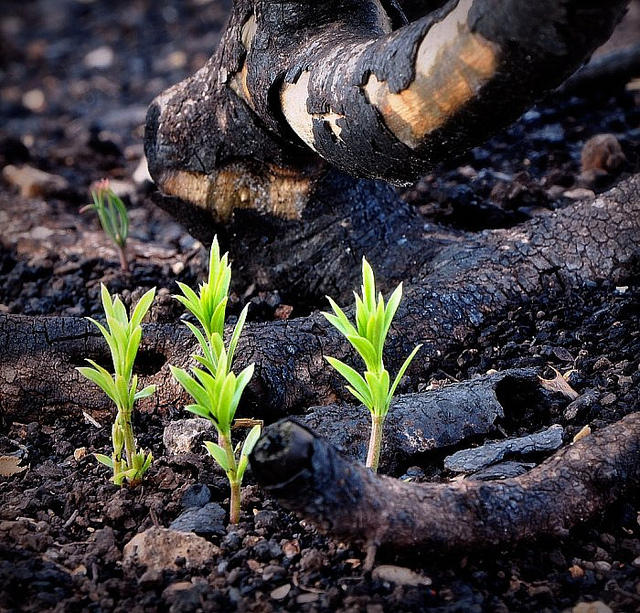A Tale of Two Pipelines
Malinda Harnish Clatterbuck is co-founder of Lancaster Against Pipelines and is a board member of the PA Community Rights Network. Her work involves bringing more awareness to the economic and political injustices of our U.S. system, one which preferences the rights of large corporations while exploiting communities and the environment.
Mallory Rose Spencer is a yoga teacher in Delaware County, PA and is a member of the Middletown Coalition for Community Safety (MCCS), a non-partisan grassroots group of residents whose goal is to educate elected officials and the public regarding the risks associated with the proposed Mariner East II pipeline.
Both activists came together with Kosmos to discuss how they are resisting the pipelines that are affecting their respective communities.
How were you called to resist the pipelines in your community?
Mallory | I’ve realized that, as a pretty well-educated, privileged person, I need to use my resources and skills more wisely and become more aware of how my actions and choices affect the ecosystem I’m a part of. When I started to see what was happening with Standing Rock in South Dakota in 2016, that was a wake-up call.
I began to consider the safety risks associated with pipelines and the environmental destruction and water contamination that was happening near me in the Philadelphia suburbs with the Mariner East II. That was how the responsibility started to awaken in me.
Malinda | I grew up in the woods of southern Lancaster County. I loved and appreciated the Earth at a very young age. My father was a hunter, and I’m a pacifist. Yet, even as a kid, I helped him butcher a deer that he shot in our basement, and I would cry. But then, I would eat the meat. From these experiences, I understood this reciprocal relationship of life and our dependency on the Earth around us.
My growing awareness of the excessive power of corporations to destroy for their own benefit is something that has been brought to my attention through this Atlantic Sunrise Pipeline Project that came through my community and is now in the ground around us. When I started learning about the power that the industry has to exploit and destroy—not only the Earth that we depend upon for life but the rights of individuals—for their own private benefit, I realized that this injustice was something I couldn’t just stand by and allow to happen without trying to change it.
What strategies have been most effective for you?
Malinda | We came together as a community, saying to the corporation, Williams Partners, “We’re not going to stand by and let you destroy our land. We will stand between you and the land if we have to.” We’ve had a thousand people sign pledges saying that they would stand with us in nonviolent direct action. To us, nonviolent direct action has meant we don’t wear masks, we are not criminals. We are residents who live here. We’re demanding justice in our own right, even if we have to get arrested for it, because what’s legal isn’t always ethical or just.
We have a strategic leadership group that plans the actions. We decided we would not destroy any equipment or possessions and do no violence to people. We don’t even interact with the workers. We come together at a pipeline construction site and hold hands, sing songs, and keep it positive. Everything we do comes out of the values we have as community members here in Lancaster.
Sometimes people get angry: “This is an injustice. It’s just wrong.” But I walk around before each action and have each person look me in the eye, and I ask them, “Can you commit to being non-violent today? If not, there is no shame in that, but walk away and come back next time when you’re in a better place.” This is to make sure everyone who’s going into the action with us is in a good place.
Before the pipeline was permitted, we went from door-to-door and made friends with all of the landowners that had not yet signed on with Williams. The Sisters of the Adorers of the Blood of Christ was one group of landowners that we reached out to in friendship. The pipeline was planned to go through their cornfield.
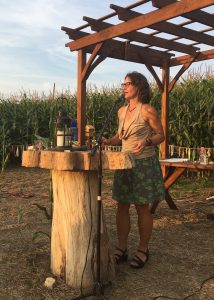
The idea of building a chapel in the path of planned construction was powerful because it gave all of us a sacred space. We cut down some of the corn and built an arbor with an altar, and over three hundred people came out for the dedication of the chapel. It became a place of pilgrimage for people all over. Arlo Guthrie’s daughter was in town and came to sing a song because she heard about what we were doing.
Just recently, the head of the Sisters had an audience with Pope Francis, and gave him a letter about our challenge here and asked if could he make a statement in support of religious rights. He’s considering that right now.
It’s brought a lot of attention. People may not come to our actions because they don’t want to get arrested or be involved in that kind of resistance, but they support the Sisters. We even had a Rosh Hashanah service there. And we’ve had Buddhist meditation there. At the first action on the Sister’s property, 23 people were arrested, including a United Methodist Minister, a Presbyterian Minister, a Mennonite Minister, and a Buddhist teacher. So, it’s an ecumenical place as well, where people come together for the sake of protecting the Earth.
Mallory | We’ve learned so much from Lancaster Against Pipelines about non-violent direct action and trying to keep it positive, spiritual, and connected to sustainability and community values. Part of what’s so empowering is saying, “This is our community. We’re going to take ownership of it. We’re going to support each other. We’re going to protect each other.”
When a foreign entity comes in and challenges your rights—taking property, drilling in your backyard, cutting down trees that have been alive for two hundred years—it can be so easy to fall into a rut of resentment, frustration, anger, and fear and want to inflict that back. But you have to be really aware and strategic in your approach, with morals and values at the forefront.
For the Middletown Coalition for Community Safety, safety is the number one priority. If we’re out doing non-violent direct action and we’re making it unsafe for participants, then how can safety be a marker for our movement? It’s been really fascinating to be aware of not creating more of the problem.
And sometimes, you lose. It can feel like one step forward, two steps back. But then I look back and realize, “Wow, they said that they were going to finish this project in 2016, and here we are in 2018 and it’s still not done.” So clearly, we have had some sort of effect in slowing them down, at least.
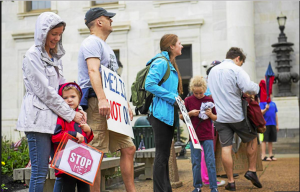
What has your experience been navigating the legal system?
Mallory | We were trying to go through the court system, and that was hard because, for the most part, the laws were already in place to be on the side of the corporation. Many people are trying to support representatives running for office who are against the pipeline. Two people who were against the Mariner East II were elected to the Delaware County Council. Yet, we’ve struggled to maintain momentum because judges keep ruling in favor of Energy Transfer Partners despite their lack of commitment to the permits they were given. To have a company continually make these mistakes, have these spills, and not be held accountable for them is extremely disheartening.
So people stopped putting all their faith in these systems and started to say, “Okay, what can I do with my physical body to slow this down or to prevent this?” We really wanted to be trained by other groups like Earth Quaker Action Team, which is based in Philadelphia, and with Malinda and Lancaster Against Pipelines, and the National Lawyers Guild—all great groups who help you understand your rights and the risks associated with what you’re trying to do, in the name of what you believe is morally and ethically right.
Malinda | Initially, we contacted the Community Environmental Legal Defense Fund. It’s an organization that focuses on community rights. And one of the things they helped us realize is that every step of the way, power is taken away from communities in projects like factory farms, fracking, and pipelines because the jobs of the regulatory agents—the Department of Environmental Protection and the EPA—is to permit destructive progress. And they do that very well. Our elected officials pass laws that allow corporations to come in and exploit and destroy because everything is based on capitalism and greed. It’s not based on valuing the Earth or community values such as taking care of each other, buying locally, and protecting our fields so that we can continue to grow crops for the next two hundred years.
Where do you draw your inspiration?
Malinda | The work that we’ve done as Lancaster Against Pipelines, and the empowerment that we felt, certainly started with Standing Rock and the courage of the people who stood up against the pipeline out there.
My husband is a Native American religion professor. We lived on a reservation in Montana for years after we first got married. The injustice done to Native American people is just astounding. Their willingness to resist and to name injustice for what it is helped me learn that injustice ‘here’ and injustice ‘there’ is connected to injustice around the world.
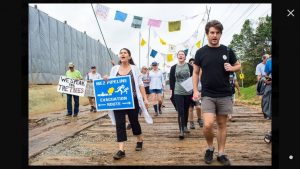
Mallory | I couldn’t agree more. I like to refer back to a lot of the things that came out of the Civil Rights Movement because that’s a great example from which people can understand—just because something’s legal doesn’t make it right. When you have people asking for … no, when you have people demanding equality and demanding to be treated with respect, you can really start to experience positive change despite the pushback and the violence, and despite those who want to maintain the status quo.
Some of the people who used to work for Energy Transfer Partners don’t work there anymore, and I know the work we’ve done has influenced the way some people think about this pipeline. The first part in influencing people’s actions is through meaningful, honest conversation that encourages them to think differently. And that’s when we’ve had the most success. Not by screaming at each other, but by listening. You’ve got to really practice that compassion towards others if you want them to show it back to you. You have to try to be respectful, but you cannot be silent.
Malinda | My husband went to the chapel one day to weed-wack. There was a Williams industry worker, high-up, who always wears a helmet with stickers on it. He was reading the Land Ethic of the Sisters that we have posted there. My husband walked over to him and said, “Are you a religious man?” He responded, “Well actually, I am. I’m Catholic.” And my husband went on to have this great conversation with him about how this is coming out of faith, to protect the Earth.
The following weekend, my husband was locked down on a piece of equipment with a friend, getting arrested. The friend is Catholic and had a rosary with him. The police officers were roughing them up a little bit, and he dropped his rosary. When the officers were walking away, this man, the Williams worker, went over and picked up the rosary. He brought it over and gave it to one of our group members, looked at my husband, and nodded his head.
It was an acknowledgment of humanity, as if to say, “I’m not angry. I’m acknowledging that you’re doing what you think you need to do, and I can’t hold that against you. You’re going to want this rosary, and it matters to me that you get this back.”
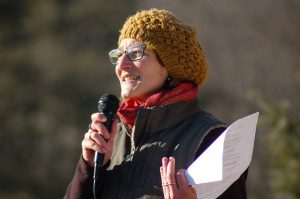
Those are the situations when I think, “Everything we’ve done is worth it.” If those kinds of changes and questions are happening within people, we’ve made great progress. We can’t control how what we do affects others, but we can control what we do and how we do it. That’s where I put my energy, in making sure that my decisions are the best I can do most of the time and trying to find grace to allow myself to fail.
I am a Pastor at a Mennonite church, which is really involved in social justice issues. What gives me energy is being able to work with children in that community, to help them be aware of the interdependency of all living things. And to value their ability to have an impact on other people, by whether they greet them with a smile or a frown. Bring it down to the simple things, the things that we adults need to remind ourselves of because we’ve gotten so far away from what really matters.
Mallory | This process has been really life-altering because I’m starting to see more and more outside of myself. I’m trying to consider the livelihood of others as well as future generations. I hope part of the narratives that are being created with groups like MCCS, Del-Chesco United for Pipeline Safety, and Lancaster Against Pipelines is to keep people mindful and aware of the whole—becoming aware of the suffering and trying, as best we can, to lessen it.





